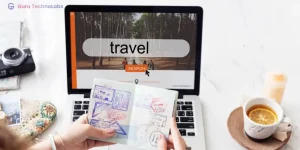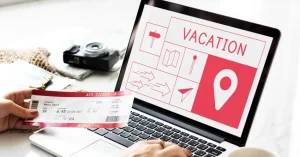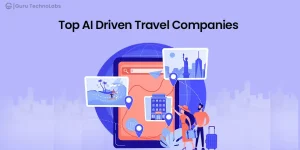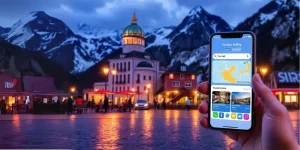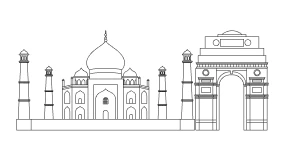What Are The Use Cases of AI In Travel and Tourism?
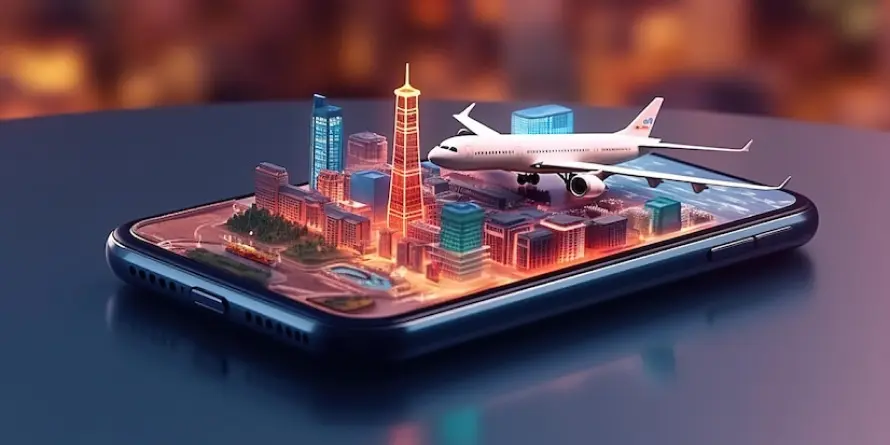
Artificial Intelligence (AI) is changing how we travel. Whether you’re booking a flight, picking a hotel, or planning your trip, AI makes everything easier, faster, and more personalized. AI helps us find great deals, avoid travel problems, and enjoy our trips more.
For travelers, this means a smoother, more enjoyable experience. You get suggestions that suit your likes, quick help from customer service, and fewer issues like lost luggage or delayed flights. For travel companies, AI helps make operations more efficient, reduces costs, and improves customer service. To delve deeper into implementing such solutions, learn how to develop enterprise AI solutions tailored for travel companies.
So let’s explore 15 ways AI is used in the travel and tourism industry to enhance our journeys. From personalized travel advice to efficient customer service, AI is transforming the travel industry and creating new ways for us to explore the world, playing a pivotal role in the digital transformation journey of travel businesses.
15 Artificial Intelligence Use Cases in Travel and Tourism
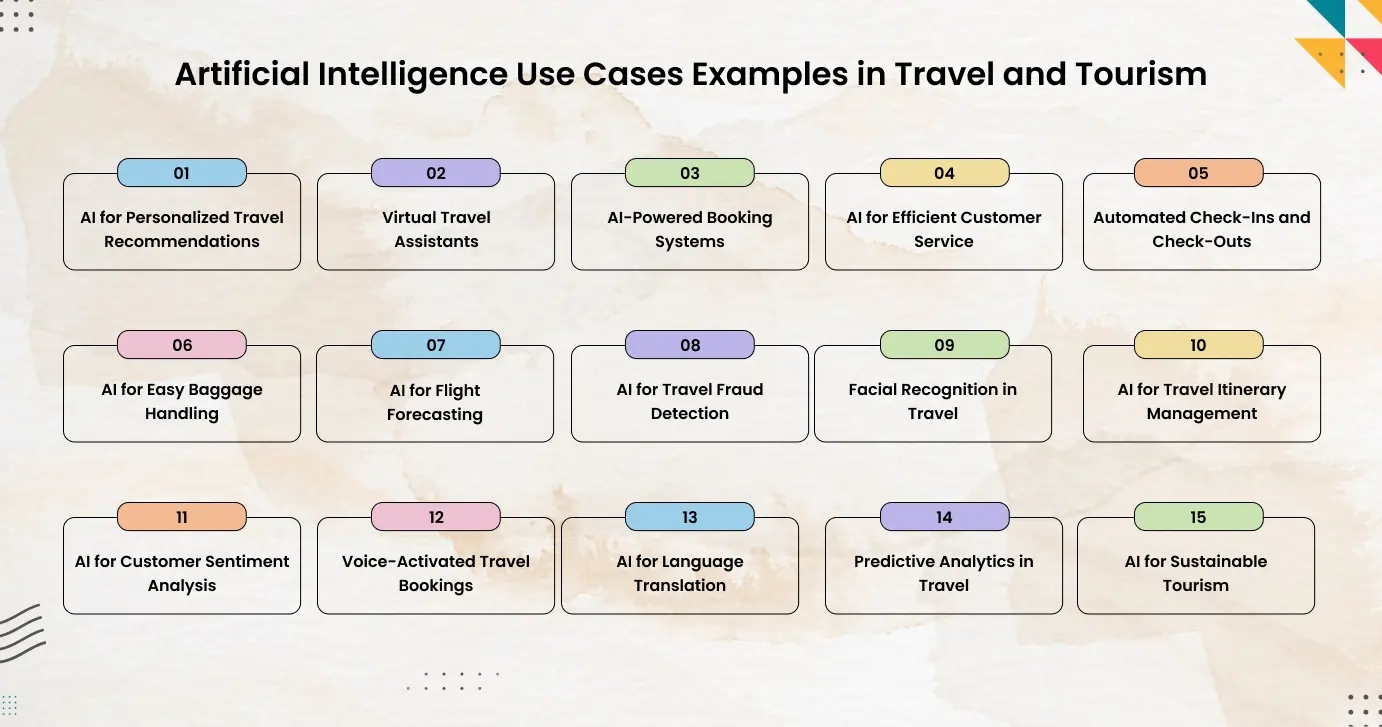
AI is making travel better in many ways. Here are 15 examples of how AI is being used and how it is improving the travel and tourism industry.
1. AI for Personalized Travel Recommendations
AI can make planning your trip easier and more fun by looking at your past travel choices and suggestions. It then uses this information to recommend destinations, activities, and places to stay that match your interests. This means that you get personalized recommendations just for you. For businesses aiming to develop these features, knowing the cost of AI app development is an important first step. This helps in making a smart investment and achieving successful results.
For example, Expedia uses AI to suggest travel options based on your preferences and where you’ve been before. If you liked a beach vacation last year, it might suggest other beach destinations or activities you might enjoy. This way, you’ll spend less time searching and more time looking forward to your trip.
2. Virtual Travel Assistants
Virtual travel assistants are like AI-powered helpers that are there for you 24/7. They can answer your travel questions, give you tips, and help you change bookings. Whether you’re looking for a restaurant, need to change a flight, or want travel advice, these assistants are always available to make your travel experience easier and more fun.
For example, KLM Royal Dutch Airlines has a virtual assistant called BlueBot (BB). BlueBot can help you book flights, answer your questions, and give you travel tips on platforms like Facebook Messenger and Twitter. This means you can get assistance whenever you need it, without waiting for a human agent.
3. AI-Powered Booking Systems
AI makes it easier and smarter to book your travel. It helps by changing prices in real-time based on demand, predicting how many people will travel to certain places, and offering personalized deals that match your preferences. This makes sure you get the best prices and options available while helping travel companies make more money.
For example, Booking.com uses AI to look at lots of data, like booking trends and customer behavior. This helps them change hotel and flight prices as needed. For instance, during busy travel times or when lots of people want to travel, prices might change to match the current market conditions.
Want to Use AI for Your Travel Business?
Discover how our AI solutions can enhance your travel business. From smarter
bookings to real-time pricing, we have the tools you need.
4. AI for Efficient Customer Service
AI makes customer service better! AI chatbots and virtual agents are like helpful assistants. They can quickly answer your questions and help solve problems. These tools are great at handling lots of requests at once, so you don’t have to wait long for help. This helps make sure you get assistance fast and improves your overall satisfaction.
For example, Hilton Hotels uses AI chatbots to help guests book rooms, find out about hotel facilities, and solve any issues during their stay. This is a great example of how AI in hospitality is transforming customer service, ensuring guests get instant support and a seamless experience.
5. Automated Check-Ins and Check-Outs
Traveling is faster and easier now because of automated check-ins and check-outs. Instead of waiting in long lines at the front desk, AI systems handle these processes smoothly. They use advanced technology like facial recognition or mobile apps to quickly confirm your identity and complete your check-in or check-out without any trouble.
For example, Marriott International has options for automated check-in and check-out through their mobile app. Guests can use their smartphones to confirm their identities and finalize their stay details, skipping the front desk. This saves time and makes the hotel experience more efficient and enjoyable.
6. AI for Easy Baggage Handling
AI is now being used to make it easier and more reliable to handle luggage. By using advanced tracking and predictive capabilities, AI helps keep a close eye on your bags throughout their trip. This means there’s less chance of your luggage getting lost or delayed, which is great news for travelers and improves their overall satisfaction.
For example, Delta Airlines uses AI and RFID (Radio Frequency Identification) technology to keep track of luggage in real-time. This helps them know exactly where each bag is at any moment, making sure it gets to its destination safely.
7. AI for Flight Forecasting
AI technology is really helpful for predicting if flights will be delayed or canceled. It looks at things like the weather, how busy the sky is, and other important information. This helps both airlines and passengers plan their trips better and know if there might be any problems.
For example, United Airlines uses AI to figure out if there will be any issues with flights. By looking at a lot of data, like past flight patterns and what the weather is like right now, United Airlines can give passengers good information to help them plan their trips.
8. AI for Travel Fraud Detection
AI is really helpful in stopping fraud in travel. It looks at the data from transactions and finds any unusual activity. This helps keep travelers and travel companies safe from losing money and makes sure transactions are secure.
Example, Expedia uses AI to watch booking transactions and find any signs of fraud. By looking at booking patterns and transaction data in real time, Expedia keeps its customers safe and makes sure travel bookings are honest.
9. Facial Recognition in Travel
Facial recognition is changing the way we go through airports. It uses technology to quickly and accurately check who we are using AI. This makes the process faster for all of us.
For example, Delta Air Lines uses facial recognition in some airports to speed up the way people get on the plane. If you’re in their program, you can just scan your face at certain spots and get on the plane faster and more safely.
10. AI for Travel Itinerary Management
AI-powered tools are designed to simplify how travelers manage their trip plans. These tools gather and organize all your bookings, reminders, and updates in one convenient place. This ensures you stay well-informed and on track throughout your journey without missing any details.
For example: TripIt, a widely-used application, uses AI to handle travel itineraries seamlessly. It automatically compiles and updates your travel details from emails, creating a comprehensive itinerary with flight schedules, hotel reservations, and even dining plans. This way, travelers have everything they need in one easy-to-access location on their phone or computer.
Want to Create an AI-Powered App for Your Travel Business?
Discover how our AI solutions can streamline travel plans for your customers.
Get in touch with us and learn more about our services.
11. AI for Customer Sentiment Analysis
AI technology is really helpful for travel companies because it can analyze customer feedback and reviews to figure out what people like and don’t like about their services. This lets companies make changes right away to make the customer experience better.
For example, TripAdvisor uses AI to read reviews from travelers all over the world. This helps hotels and travel destinations see what customers are saying so they can make things better based on what people like and don’t like.
12. Voice-Activated Travel Bookings
Virtual assistants that respond to voice commands have made a big impact on how people book their trips. These assistants let travelers reserve flights, hotels, and activities just by speaking to them. This simple and convenient way of booking makes it easier for more people to plan their trips.
For example, Kayak, a popular travel search engine, has added the ability to book trips using voice commands through Amazon Alexa. Travelers can now use their voice to look for flights, compare prices, and book their travel plans directly through the Kayak skill on Alexa-enabled devices. This makes travel planning more convenient and accessible.
13. AI for Language Translation
AI-powered translation tools are changing the way we travel by helping us understand different languages. These tools can quickly translate conversations, signs, and menus, making it easier to communicate and get around in other countries.
For example, Google Translate is a popular tool that travelers use. It can translate text, speech, and even images into over 100 languages. This means you can use your phone to understand and talk in different languages, which makes traveling to new places more fun and less difficult.
14. Predictive Analytics in Travel
Predictive analytics is like using super smart computer programs to figure out what will happen in the future for travel. It helps travel companies plan better, decide on prices, and use their stuff (like rooms or cars) in the best way.
For example, Airbnb uses predictive analytics to guess how many people will want to book a place and then changes the prices to match. They look at things like when people usually book, big events happening, and when more people tend to travel. This helps them to set prices that work for customers and make sure they make as much money as possible.
15. AI for Sustainable Tourism
AI technology is helping the tourism industry become more sustainable by helping travel businesses use resources more efficiently, reduce waste, and minimize the environmental impact of travel. This supports the industry’s goal to operate in eco-friendly ways and promote sustainability.
For example, Hilton Hotels uses AI to make its sustainability efforts better. By using smart energy systems and eco-friendly practices, Hilton reduces its impact on the environment while providing guests with comfortable and environmentally-friendly places to stay. This shows a global effort to protect natural resources and the environment for future generations.
Conclusion
AI is transforming the travel and tourism industry by improving customer experiences, making operations more efficient, and promoting sustainability. With AI travel companies can stay competitive, work smarter, and offer personalized services. This technology helps businesses understand what customers want, streamline processes, and adopt eco-friendly practices. By using AI, the travel industry can keep innovating and meeting the needs of travelers everywhere.
Frequently Asked Questions
AI can make traveling better for your customers by providing them with personalized recommendations, fast customer service, immediate updates, and convenient features such as automated check-ins and baggage handling. These improvements help travelers have a more seamless and enjoyable experience throughout their journey.
The travel industry faces several big challenges when it comes to using AI. These include high costs, worries about keeping customer data safe, making sure AI can work smoothly with existing systems, and the need to update and maintain the technology regularly .
AI can help your travel business make more money by looking at what's happening in the market, how customers behave, and what prices your competitors are offering. It then uses this info to change your prices in real-time, so you can make as much money as possible and keep your travel business busy. This helps you stay competitive and take advantage of opportunities in the market.
AI improves airport operations by predicting maintenance needs, scheduling efficiently, and tracking assets in real-time. For security checks, AI uses facial recognition and behavior analysis to enhance safety and shorten wait times. This makes airports run smoother and ensures travelers have a safer and more efficient experience.
The cost of implementing AI in a travel business depends on how complex the technology is, the size of the business, and what exactly it's being used for. Basic AI tools might cost $20,000 to $200,000, while more advanced or custom solutions will cost $500,000 or more. It all depends on what the business needs and how extensive the AI implementation is.
AI personalized travel recommendations by studying customer data, preferences, and past actions. It uses this information to suggest destinations, hotels, and activities that match each person's interests and requirements. This way, travelers receive customized suggestions that make their trip planning easier and more enjoyable.




